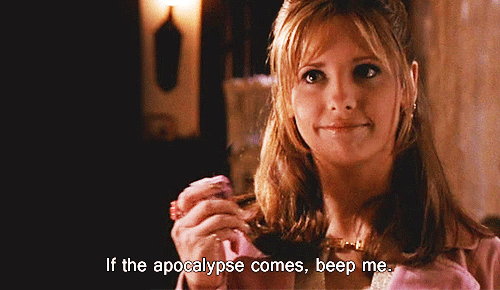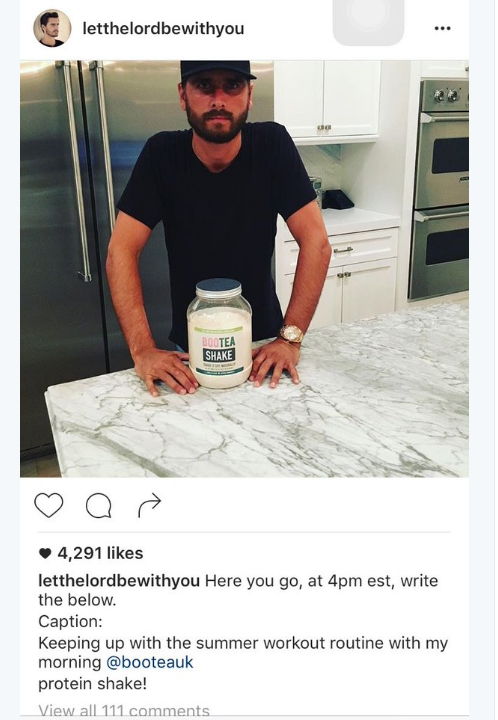Bad marketers are like vampires, except they’re also really bad at being vampires.
Good vampires, in the Dracula sense, or even to a degree the Edward Cullen sense, are seductive creatures. They make their victims want to be bitten, even if it’s against their own best interest.
Bad vampires show up where there’s a crowd of people, close their eyes and start swinging their fangs around. They’re lucky to get a drop of blood edgewise, and their would-be prey will high-tail it out of there. The really clever humans, the Buffys of the world, pull stakes out of their shoes and get to work.
Bless the Buffys of the world. They’re out there protecting us against bad marketers.

Good marketers are nothing like vampires. They’re also not nearly as cool as vampire hunters. They’re just good marketers. They know how to tell the right stories to people who actually want to hear them in order to encourage a specific outcome.
Or at least they try to. You know what’s really hard? Being perfect. In the perfect world, you’d always have the info, skills and resources you need to be a good marketer. In the real world, the ugly, vague world that we live in, things are rarely that clear.
For the good marketer, that means it can be very easy to fall into vampirism. I don’t think marketers do that on purpose. I think they do it because they don’t know what to do and they don’t realize that they’re turning undead.
I have to check myself all the time. So I developed a few rules that I can check myself against. They probably won’t work for everyone, they can definitely be improved upon (and I’d love your suggestions! @danieljflowers on Twitter, I’d love to chat) but they help me not turn into everything I hate.
Does anybody want you here?
You’re at a party. You’re talking to your crush (remember crushes?) and you’re feeling pretty psyched about it. Some laughs, some fleeting-yet-meaningful eye contact – things are going pretty well, casanova!

Until some guy neither of you likes (because Christ, he always does this) walks in between the two of you, starts spinning in a circle and shouting about how he starts for the lacrosse team.
Imagine that, except the guy crashes through the window, is dressed in a jumpsuit covered in Tide detergent logos and forces you to touch a tiny X on his shoulder before he’ll quit it (and sure, for the sake of the extended metaphor, he’s also a vampire).
Relatively speaking, he was easy to get rid of, but boy did he ruin that moment.
That’s what bad, clumsy marketers do all the time, and it’s most people’s main gripe with outbound (more or less traditional) marketing.
To be sure, there’s some level of this kind of interruption that’s unavoidable. Nobody ever, ever, wants to be marketed to, but marketing is also an essential link on the chain of commerce that, for better or worse, binds the capitalist world together. People expect and tolerate some advertising in almost everything, from TV commercials to sponsored posts on Facebook.
Before jumping into anything, though, I ask myself “does anybody want me here?”
Generally, the best answer I can hope for is “kind of,” and I can usually justify doing some marketing if that’s the case. If I’m unclear, though, I bounce over to question 2.
Will I ruin anything by showing up?
Obviously, the Tide vampire above not only ruins something, he ruins everything.
You see this happening egregiously on places like Quora, where folks can ask and answer questions pretty freely.
There will be a nice discussion going on, and as soon as some marketing vampire sniffs out the opportunity to drive a little traffic, they’ll swoop in with some pre-written, out-of-context response laced with links to their money sites.
If the discussion is already going, they can derail, though hopefully the community will quickly report them or vote them down.
It feels much sadder when someone has a legitimate question and a vampire shows up immediately, providing the first and top response. More often than not, that will kill a question in its infancy.
Usually, though, the situation is a little less clear cut.
For example, a Facebook page I help to manage for an exclusive organization gets a ton of really great engagement and discussion from the membership. With very little prompting, they’ll share our posts, advocate on our behalf, provide glowing testimonials and more.
I had a gut reaction, when this first started happening, to try and encourage it by jumping in and thanking folks for writing, asking them further questions and generally being a nice guy.
But I would be doing all that as the brand. I took a breath and realized that if I did that, I’d be taking all these nice folks and making them look like shills for my brand. So I pushed my keyboard away, let it go, and the Facebook page was all the better for it.
Am I exploiting anyone?
Exploitation can take many forms. The most indefensible stuff you and I would never touch: televangelists preying on the elderly, companies calling business owners pretending to be Google – anything that seeks out a vulnerability, magnifies it and leverages it against someone to compel them to take an action would qualify.
Mostly, though, exploitation in marketing is both casual and minor and it can be hard to notice that you’re doing it. After all, there’s some truth to the critique that marketing thrives on manufacturing artificial needs for people that can then be filled with specific products. This guideline, more than the two above, is highly personal to me, and might not govern your behavior quite so closely.
Influencer marketing, for instance, is very popular, highly unregulated and potentially exploitative. Influencer marketing basically entails companies providing some kind of kickback to folks that are popular on the internet in return for those folks talking about their products.
It was designed to be a sneaky, e-savvy way to dodge vampire questions 1 and 2 above. Sure, nobody cares about your product and nobody wants to hear about it. But they already follow this celebrity, so they might not mind so much if they pretend to use it.
This is really not that much different from the typical celebrity endorsement, except in this case, companies really want you to think that these influencers are doing all of this out of their own volition.
There are exploitative and non-exploitative ways to do this. Non-exploitative methods lean on transparency. Brands enlist YouTube stars to produce content for their channels. Drum companies sponsor rising talents. Everyone knows what’s going on.
The more exploitative way of doing this (disclaimer: I’m not even sure I would never do this, but it doesn’t sit super well with me) is to just throw some money or product at someone so they can pretend to use your stuff on Instagram.
This tactic, in the minds of many marketers, is deeply stupid. It’s also losing currency with savvy social media users. You can get exploited if you think everyone’s being sincere, but if you know that your favorite Instagram personalities are only talking about something for money, it’s no different than any other endorsement.
Scott Disick of Keeping Up With The Kardashians recently accidentally illustrated the lunacy of bad influencer marketing.

It should go without saying that Disick was not supposed to copy and paste the instruction from his handler to post at 4pm. For the internet, this was a comical, emperor-has-no-clothes moment. Everyone already knew this was an exploitative practice and Disick forced us to acknowledge it out loud.
For me, the question “am I exploiting anyone?” not only helps me to feel better about my job, but it also protects me from moments like these, where everybody calls my bluff.
Does this make me want to quit my job?
The big, final question I ask myself, the one that trumps everything, is if something makes me want to put in my 2 weeks.
I should note: LUMINUS has never and will never ask me to do anything like that. In many ways, this is a dream job, majorly because I’m given a whole lot of autonomy over what I do. They trust me to make the right decisions and I do my best to make them.
But I also want to be good at my job, deliver superior returns, impress my friends and peers, win awards and see all my favorite metrics skyrocket. Sometimes, marketing practices that don’t quite pass the muster of the above rules seem very tempting. After all, isn’t the most important thing finding strategies that work?
I’ll soften the following comment by first saying that, for every unethical strategy, there’s likely an ethical analog that’s just as effective.
But still: if I feel like something in unethical, exploitative or even a needless, major bummer, I’m not going to undermine my own integrity to do it. That’s why I don’t write think pieces about celebrity deaths, it’s why I don’t create false scarcity on my landing pages and it’s why I get to work at a place like LUMINUS and feel great about it.
